BN201 Assignment: Exploring Ethical and Social Issues in ICT Field
VerifiedAdded on 2023/06/11
|7
|1706
|70
Report
AI Summary
This assignment solution delves into the ethical considerations within the Information and Communication Technology (ICT) sector, utilizing the Australian Computer Society (ACS) code of ethics as a framework. It presents two case studies: the first examines the ethical implications of conducting usability tests on a website with internal and external participants, focusing on the necessity of informed consent. The second case study addresses the ethical dilemma faced by an environmental compliance manager in a plastic manufacturing organization, weighing the costs of implementing new technology to reduce chemical waste against the potential environmental impact. The analysis emphasizes the importance of adhering to ethical codes in maintaining integrity and ensuring that business practices prioritize public interest, quality of life, honesty, competence, and professional development. The report concludes that ethical codes are crucial for guiding organizational conduct and maintaining the integrity of the ICT profession.
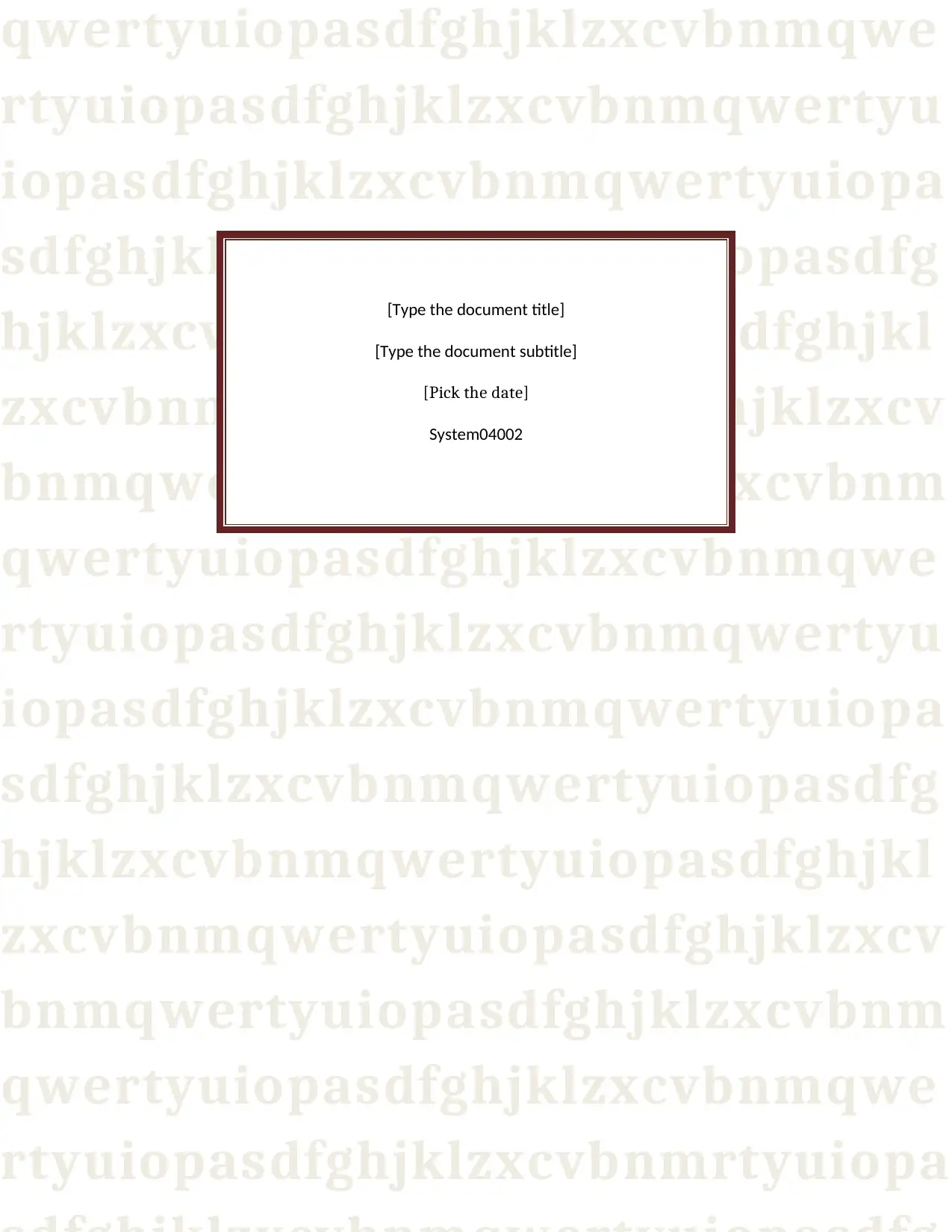
qwertyuiopasdfghjklzxcvbnmqwe
rtyuiopasdfghjklzxcvbnmqwertyu
iopasdfghjklzxcvbnmqwertyuiopa
sdfghjklzxcvbnmqwertyuiopasdfg
hjklzxcvbnmqwertyuiopasdfghjkl
zxcvbnmqwertyuiopasdfghjklzxcv
bnmqwertyuiopasdfghjklzxcvbnm
qwertyuiopasdfghjklzxcvbnmqwe
rtyuiopasdfghjklzxcvbnmqwertyu
iopasdfghjklzxcvbnmqwertyuiopa
sdfghjklzxcvbnmqwertyuiopasdfg
hjklzxcvbnmqwertyuiopasdfghjkl
zxcvbnmqwertyuiopasdfghjklzxcv
bnmqwertyuiopasdfghjklzxcvbnm
qwertyuiopasdfghjklzxcvbnmqwe
rtyuiopasdfghjklzxcvbnmrtyuiopa
[Type the document title]
[Type the document subtitle]
[Pick the date]
System04002
rtyuiopasdfghjklzxcvbnmqwertyu
iopasdfghjklzxcvbnmqwertyuiopa
sdfghjklzxcvbnmqwertyuiopasdfg
hjklzxcvbnmqwertyuiopasdfghjkl
zxcvbnmqwertyuiopasdfghjklzxcv
bnmqwertyuiopasdfghjklzxcvbnm
qwertyuiopasdfghjklzxcvbnmqwe
rtyuiopasdfghjklzxcvbnmqwertyu
iopasdfghjklzxcvbnmqwertyuiopa
sdfghjklzxcvbnmqwertyuiopasdfg
hjklzxcvbnmqwertyuiopasdfghjkl
zxcvbnmqwertyuiopasdfghjklzxcv
bnmqwertyuiopasdfghjklzxcvbnm
qwertyuiopasdfghjklzxcvbnmqwe
rtyuiopasdfghjklzxcvbnmrtyuiopa
[Type the document title]
[Type the document subtitle]
[Pick the date]
System04002
Paraphrase This Document
Need a fresh take? Get an instant paraphrase of this document with our AI Paraphraser
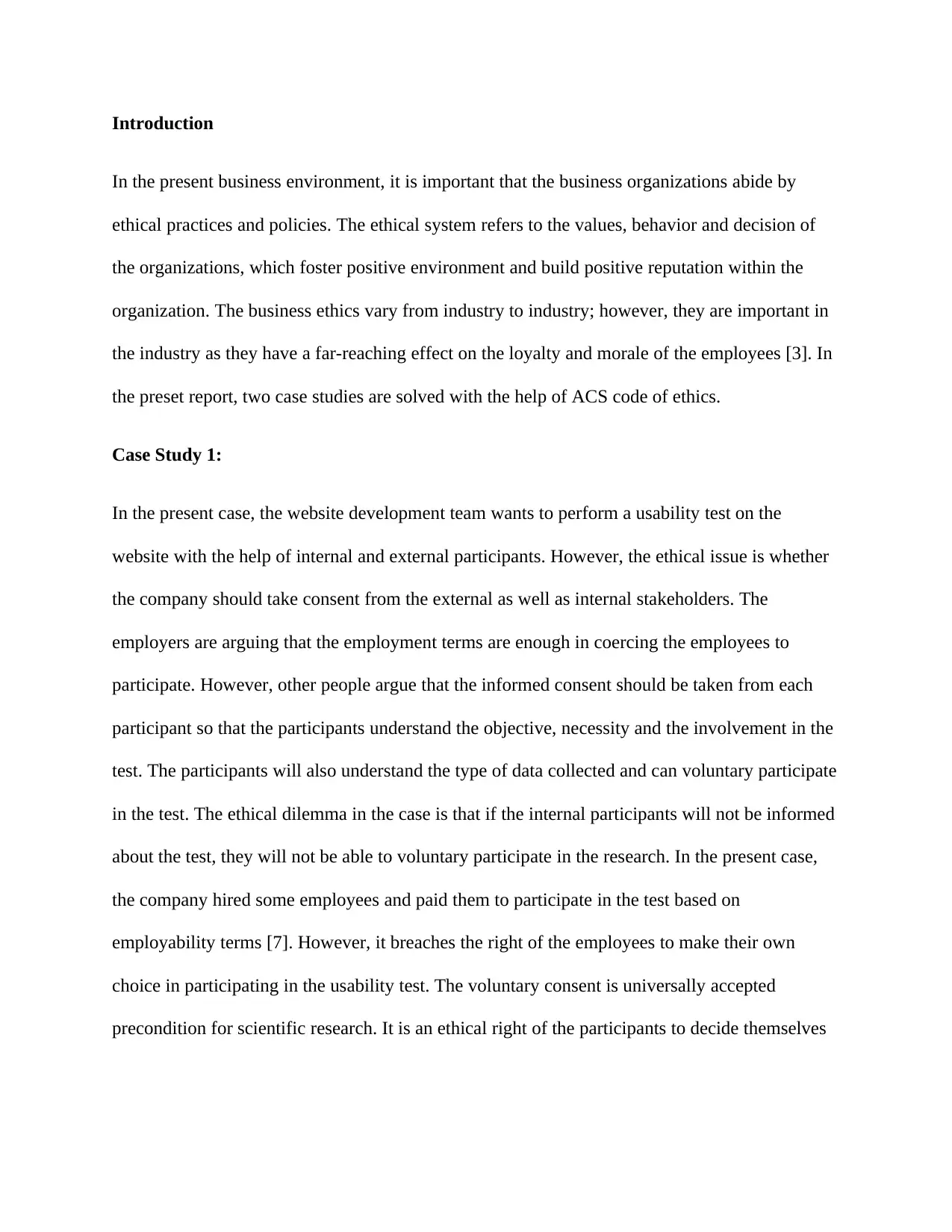
Introduction
In the present business environment, it is important that the business organizations abide by
ethical practices and policies. The ethical system refers to the values, behavior and decision of
the organizations, which foster positive environment and build positive reputation within the
organization. The business ethics vary from industry to industry; however, they are important in
the industry as they have a far-reaching effect on the loyalty and morale of the employees [3]. In
the preset report, two case studies are solved with the help of ACS code of ethics.
Case Study 1:
In the present case, the website development team wants to perform a usability test on the
website with the help of internal and external participants. However, the ethical issue is whether
the company should take consent from the external as well as internal stakeholders. The
employers are arguing that the employment terms are enough in coercing the employees to
participate. However, other people argue that the informed consent should be taken from each
participant so that the participants understand the objective, necessity and the involvement in the
test. The participants will also understand the type of data collected and can voluntary participate
in the test. The ethical dilemma in the case is that if the internal participants will not be informed
about the test, they will not be able to voluntary participate in the research. In the present case,
the company hired some employees and paid them to participate in the test based on
employability terms [7]. However, it breaches the right of the employees to make their own
choice in participating in the usability test. The voluntary consent is universally accepted
precondition for scientific research. It is an ethical right of the participants to decide themselves
In the present business environment, it is important that the business organizations abide by
ethical practices and policies. The ethical system refers to the values, behavior and decision of
the organizations, which foster positive environment and build positive reputation within the
organization. The business ethics vary from industry to industry; however, they are important in
the industry as they have a far-reaching effect on the loyalty and morale of the employees [3]. In
the preset report, two case studies are solved with the help of ACS code of ethics.
Case Study 1:
In the present case, the website development team wants to perform a usability test on the
website with the help of internal and external participants. However, the ethical issue is whether
the company should take consent from the external as well as internal stakeholders. The
employers are arguing that the employment terms are enough in coercing the employees to
participate. However, other people argue that the informed consent should be taken from each
participant so that the participants understand the objective, necessity and the involvement in the
test. The participants will also understand the type of data collected and can voluntary participate
in the test. The ethical dilemma in the case is that if the internal participants will not be informed
about the test, they will not be able to voluntary participate in the research. In the present case,
the company hired some employees and paid them to participate in the test based on
employability terms [7]. However, it breaches the right of the employees to make their own
choice in participating in the usability test. The voluntary consent is universally accepted
precondition for scientific research. It is an ethical right of the participants to decide themselves
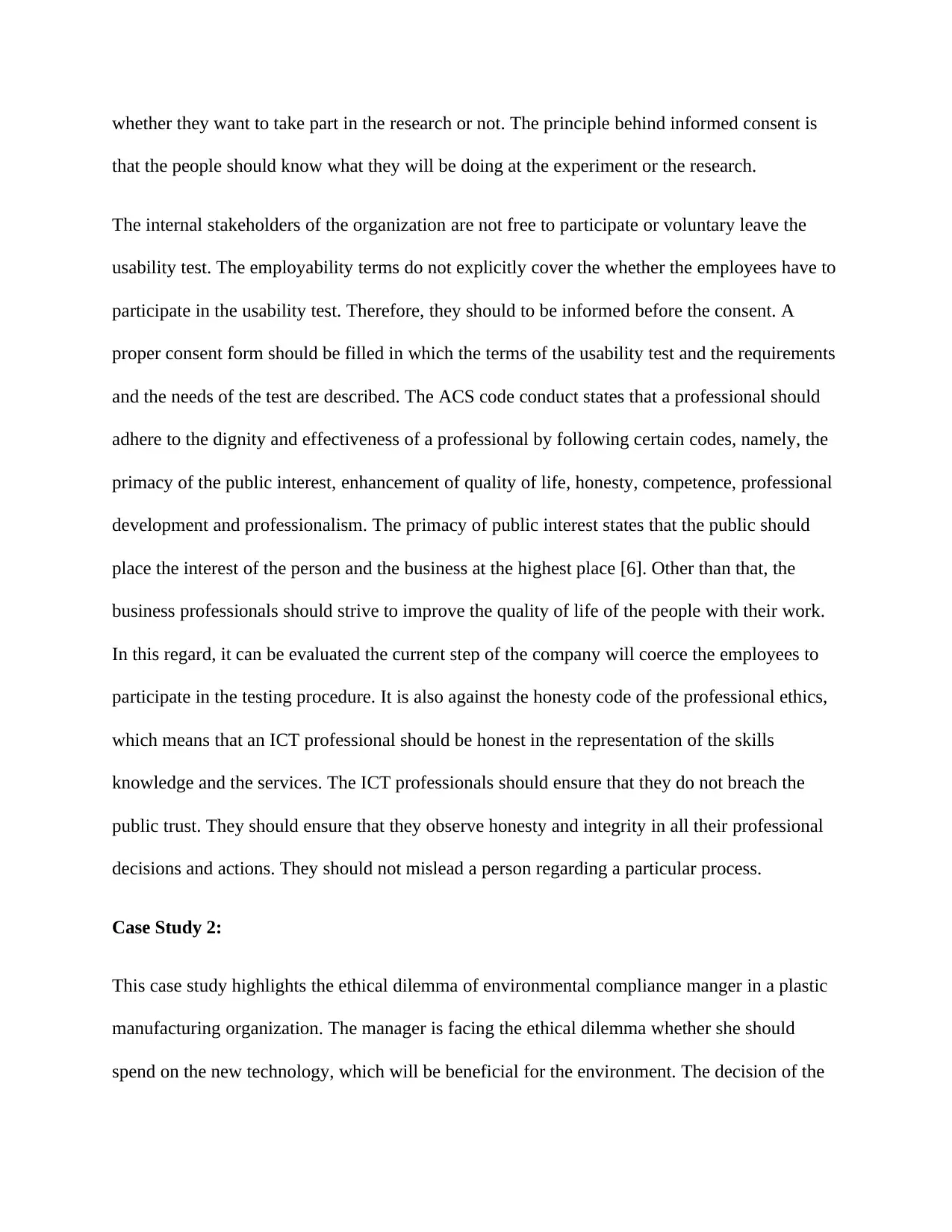
whether they want to take part in the research or not. The principle behind informed consent is
that the people should know what they will be doing at the experiment or the research.
The internal stakeholders of the organization are not free to participate or voluntary leave the
usability test. The employability terms do not explicitly cover the whether the employees have to
participate in the usability test. Therefore, they should to be informed before the consent. A
proper consent form should be filled in which the terms of the usability test and the requirements
and the needs of the test are described. The ACS code conduct states that a professional should
adhere to the dignity and effectiveness of a professional by following certain codes, namely, the
primacy of the public interest, enhancement of quality of life, honesty, competence, professional
development and professionalism. The primacy of public interest states that the public should
place the interest of the person and the business at the highest place [6]. Other than that, the
business professionals should strive to improve the quality of life of the people with their work.
In this regard, it can be evaluated the current step of the company will coerce the employees to
participate in the testing procedure. It is also against the honesty code of the professional ethics,
which means that an ICT professional should be honest in the representation of the skills
knowledge and the services. The ICT professionals should ensure that they do not breach the
public trust. They should ensure that they observe honesty and integrity in all their professional
decisions and actions. They should not mislead a person regarding a particular process.
Case Study 2:
This case study highlights the ethical dilemma of environmental compliance manger in a plastic
manufacturing organization. The manager is facing the ethical dilemma whether she should
spend on the new technology, which will be beneficial for the environment. The decision of the
that the people should know what they will be doing at the experiment or the research.
The internal stakeholders of the organization are not free to participate or voluntary leave the
usability test. The employability terms do not explicitly cover the whether the employees have to
participate in the usability test. Therefore, they should to be informed before the consent. A
proper consent form should be filled in which the terms of the usability test and the requirements
and the needs of the test are described. The ACS code conduct states that a professional should
adhere to the dignity and effectiveness of a professional by following certain codes, namely, the
primacy of the public interest, enhancement of quality of life, honesty, competence, professional
development and professionalism. The primacy of public interest states that the public should
place the interest of the person and the business at the highest place [6]. Other than that, the
business professionals should strive to improve the quality of life of the people with their work.
In this regard, it can be evaluated the current step of the company will coerce the employees to
participate in the testing procedure. It is also against the honesty code of the professional ethics,
which means that an ICT professional should be honest in the representation of the skills
knowledge and the services. The ICT professionals should ensure that they do not breach the
public trust. They should ensure that they observe honesty and integrity in all their professional
decisions and actions. They should not mislead a person regarding a particular process.
Case Study 2:
This case study highlights the ethical dilemma of environmental compliance manger in a plastic
manufacturing organization. The manager is facing the ethical dilemma whether she should
spend on the new technology, which will be beneficial for the environment. The decision of the
⊘ This is a preview!⊘
Do you want full access?
Subscribe today to unlock all pages.

Trusted by 1+ million students worldwide
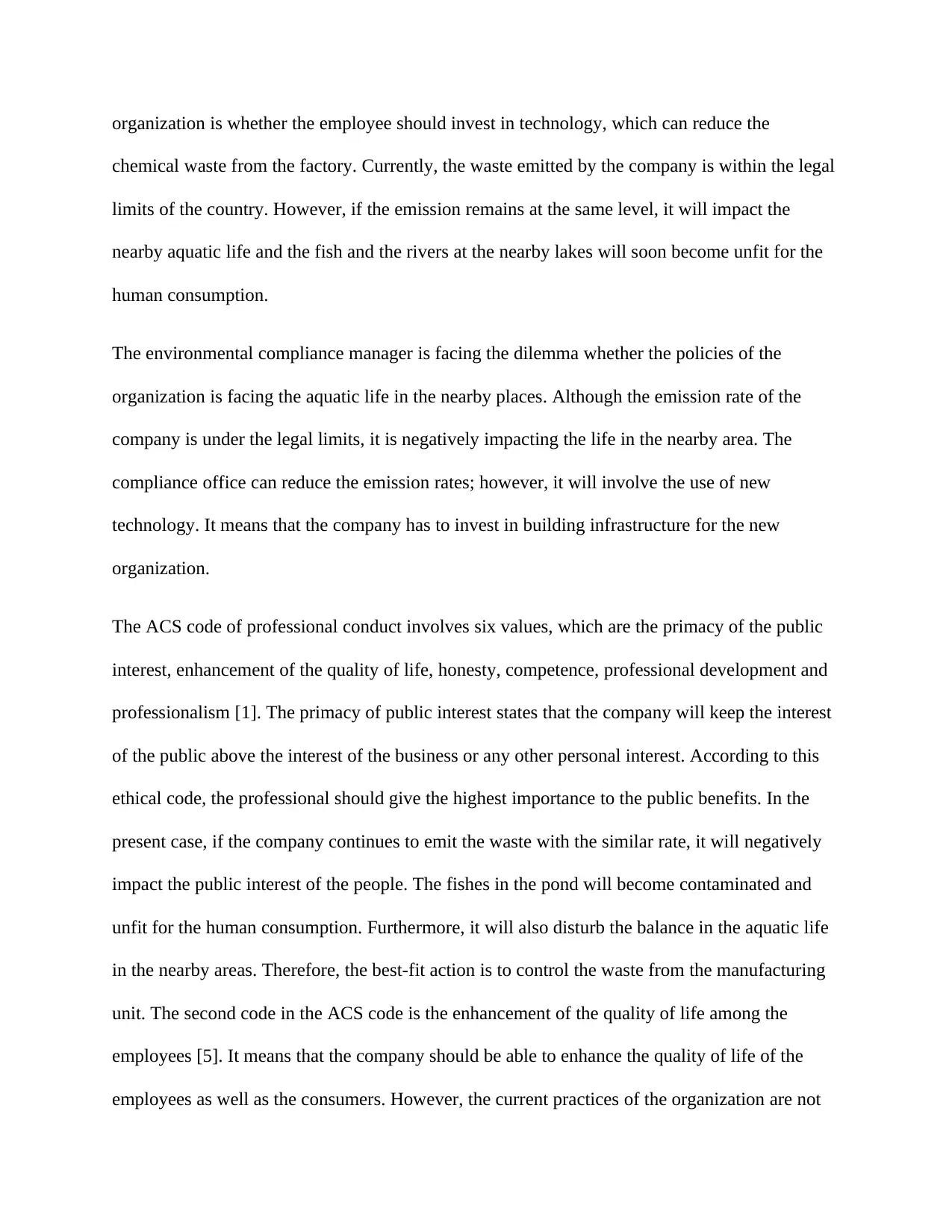
organization is whether the employee should invest in technology, which can reduce the
chemical waste from the factory. Currently, the waste emitted by the company is within the legal
limits of the country. However, if the emission remains at the same level, it will impact the
nearby aquatic life and the fish and the rivers at the nearby lakes will soon become unfit for the
human consumption.
The environmental compliance manager is facing the dilemma whether the policies of the
organization is facing the aquatic life in the nearby places. Although the emission rate of the
company is under the legal limits, it is negatively impacting the life in the nearby area. The
compliance office can reduce the emission rates; however, it will involve the use of new
technology. It means that the company has to invest in building infrastructure for the new
organization.
The ACS code of professional conduct involves six values, which are the primacy of the public
interest, enhancement of the quality of life, honesty, competence, professional development and
professionalism [1]. The primacy of public interest states that the company will keep the interest
of the public above the interest of the business or any other personal interest. According to this
ethical code, the professional should give the highest importance to the public benefits. In the
present case, if the company continues to emit the waste with the similar rate, it will negatively
impact the public interest of the people. The fishes in the pond will become contaminated and
unfit for the human consumption. Furthermore, it will also disturb the balance in the aquatic life
in the nearby areas. Therefore, the best-fit action is to control the waste from the manufacturing
unit. The second code in the ACS code is the enhancement of the quality of life among the
employees [5]. It means that the company should be able to enhance the quality of life of the
employees as well as the consumers. However, the current practices of the organization are not
chemical waste from the factory. Currently, the waste emitted by the company is within the legal
limits of the country. However, if the emission remains at the same level, it will impact the
nearby aquatic life and the fish and the rivers at the nearby lakes will soon become unfit for the
human consumption.
The environmental compliance manager is facing the dilemma whether the policies of the
organization is facing the aquatic life in the nearby places. Although the emission rate of the
company is under the legal limits, it is negatively impacting the life in the nearby area. The
compliance office can reduce the emission rates; however, it will involve the use of new
technology. It means that the company has to invest in building infrastructure for the new
organization.
The ACS code of professional conduct involves six values, which are the primacy of the public
interest, enhancement of the quality of life, honesty, competence, professional development and
professionalism [1]. The primacy of public interest states that the company will keep the interest
of the public above the interest of the business or any other personal interest. According to this
ethical code, the professional should give the highest importance to the public benefits. In the
present case, if the company continues to emit the waste with the similar rate, it will negatively
impact the public interest of the people. The fishes in the pond will become contaminated and
unfit for the human consumption. Furthermore, it will also disturb the balance in the aquatic life
in the nearby areas. Therefore, the best-fit action is to control the waste from the manufacturing
unit. The second code in the ACS code is the enhancement of the quality of life among the
employees [5]. It means that the company should be able to enhance the quality of life of the
employees as well as the consumers. However, the current practices of the organization are not
Paraphrase This Document
Need a fresh take? Get an instant paraphrase of this document with our AI Paraphraser
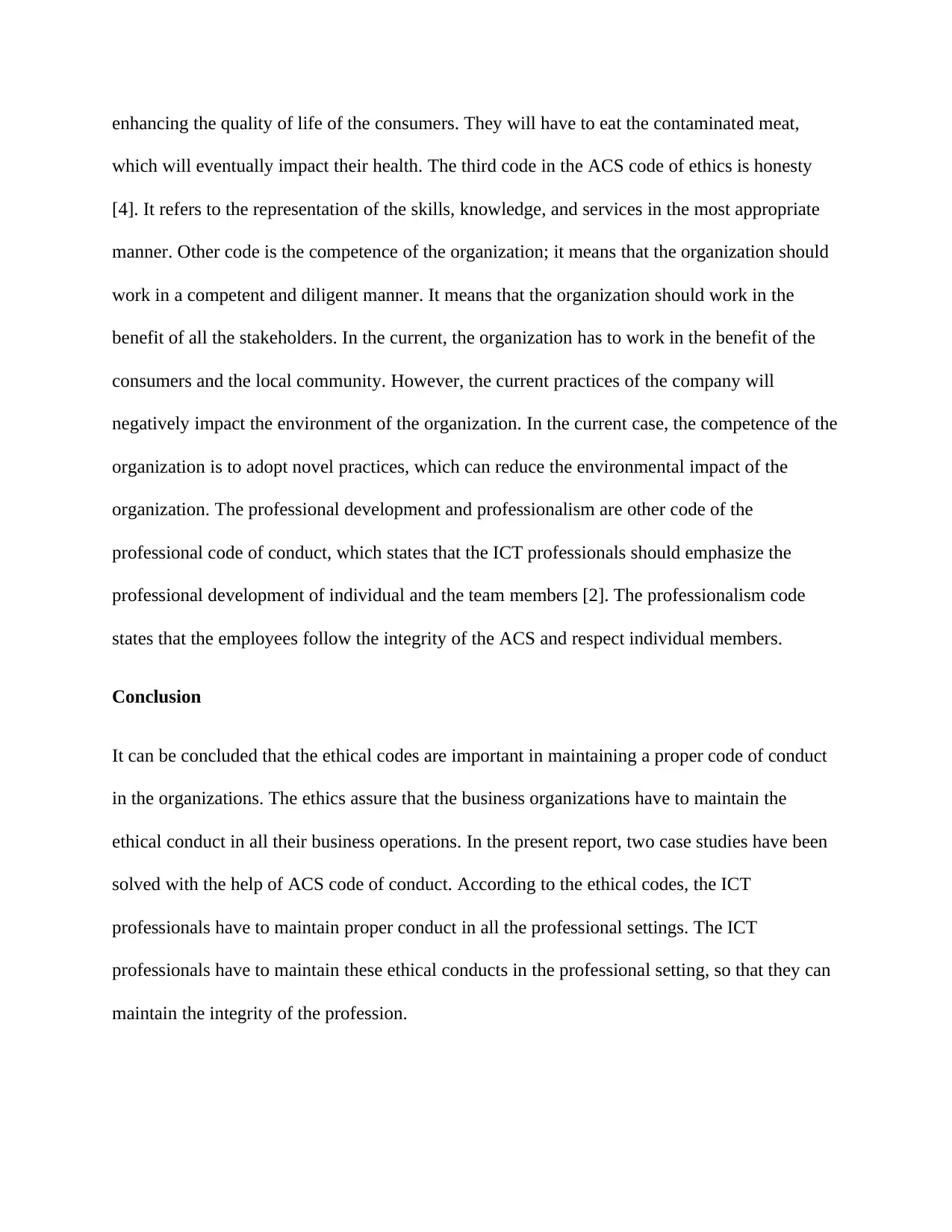
enhancing the quality of life of the consumers. They will have to eat the contaminated meat,
which will eventually impact their health. The third code in the ACS code of ethics is honesty
[4]. It refers to the representation of the skills, knowledge, and services in the most appropriate
manner. Other code is the competence of the organization; it means that the organization should
work in a competent and diligent manner. It means that the organization should work in the
benefit of all the stakeholders. In the current, the organization has to work in the benefit of the
consumers and the local community. However, the current practices of the company will
negatively impact the environment of the organization. In the current case, the competence of the
organization is to adopt novel practices, which can reduce the environmental impact of the
organization. The professional development and professionalism are other code of the
professional code of conduct, which states that the ICT professionals should emphasize the
professional development of individual and the team members [2]. The professionalism code
states that the employees follow the integrity of the ACS and respect individual members.
Conclusion
It can be concluded that the ethical codes are important in maintaining a proper code of conduct
in the organizations. The ethics assure that the business organizations have to maintain the
ethical conduct in all their business operations. In the present report, two case studies have been
solved with the help of ACS code of conduct. According to the ethical codes, the ICT
professionals have to maintain proper conduct in all the professional settings. The ICT
professionals have to maintain these ethical conducts in the professional setting, so that they can
maintain the integrity of the profession.
which will eventually impact their health. The third code in the ACS code of ethics is honesty
[4]. It refers to the representation of the skills, knowledge, and services in the most appropriate
manner. Other code is the competence of the organization; it means that the organization should
work in a competent and diligent manner. It means that the organization should work in the
benefit of all the stakeholders. In the current, the organization has to work in the benefit of the
consumers and the local community. However, the current practices of the company will
negatively impact the environment of the organization. In the current case, the competence of the
organization is to adopt novel practices, which can reduce the environmental impact of the
organization. The professional development and professionalism are other code of the
professional code of conduct, which states that the ICT professionals should emphasize the
professional development of individual and the team members [2]. The professionalism code
states that the employees follow the integrity of the ACS and respect individual members.
Conclusion
It can be concluded that the ethical codes are important in maintaining a proper code of conduct
in the organizations. The ethics assure that the business organizations have to maintain the
ethical conduct in all their business operations. In the present report, two case studies have been
solved with the help of ACS code of conduct. According to the ethical codes, the ICT
professionals have to maintain proper conduct in all the professional settings. The ICT
professionals have to maintain these ethical conducts in the professional setting, so that they can
maintain the integrity of the profession.

⊘ This is a preview!⊘
Do you want full access?
Subscribe today to unlock all pages.

Trusted by 1+ million students worldwide
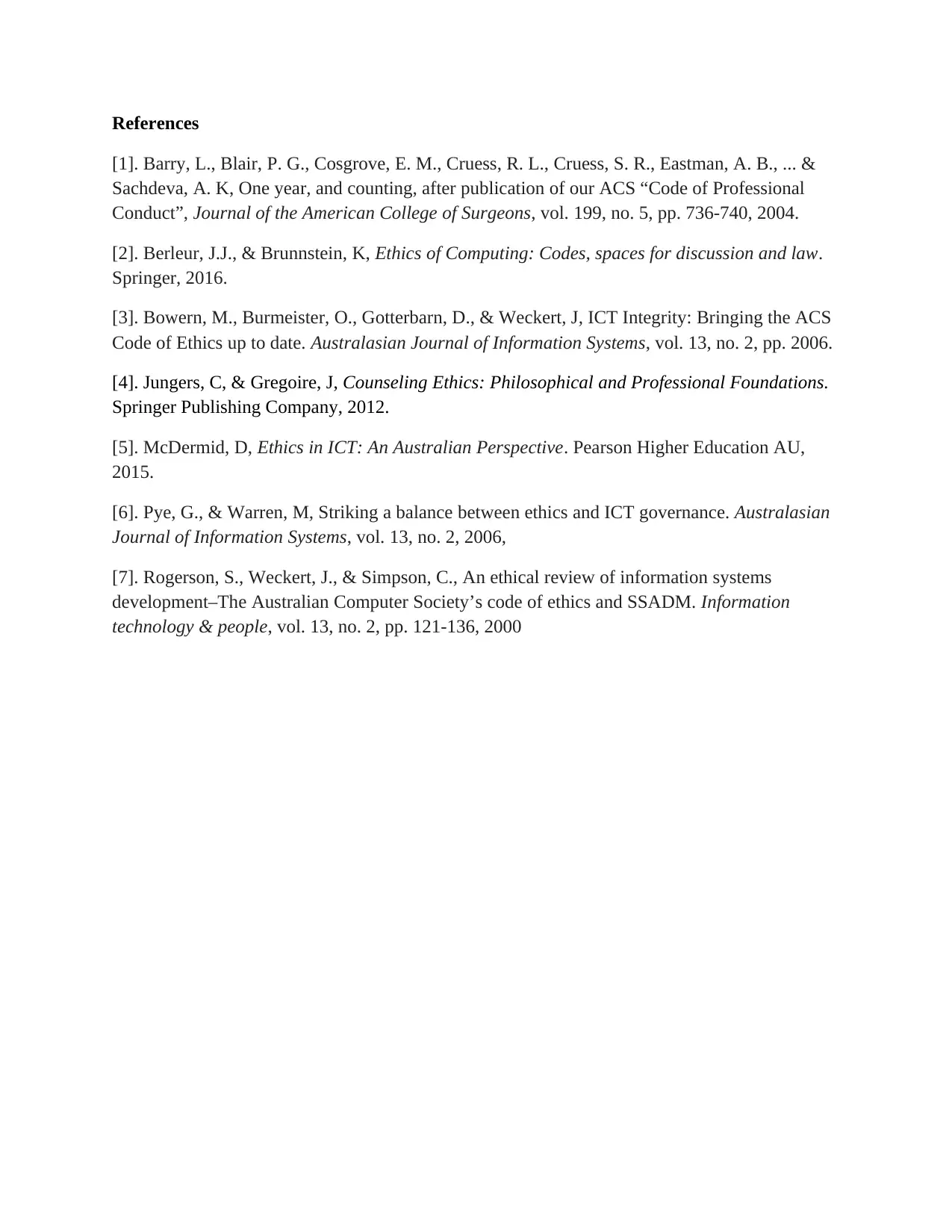
References
[1]. Barry, L., Blair, P. G., Cosgrove, E. M., Cruess, R. L., Cruess, S. R., Eastman, A. B., ... &
Sachdeva, A. K, One year, and counting, after publication of our ACS “Code of Professional
Conduct”, Journal of the American College of Surgeons, vol. 199, no. 5, pp. 736-740, 2004.
[2]. Berleur, J.J., & Brunnstein, K, Ethics of Computing: Codes, spaces for discussion and law.
Springer, 2016.
[3]. Bowern, M., Burmeister, O., Gotterbarn, D., & Weckert, J, ICT Integrity: Bringing the ACS
Code of Ethics up to date. Australasian Journal of Information Systems, vol. 13, no. 2, pp. 2006.
[4]. Jungers, C, & Gregoire, J, Counseling Ethics: Philosophical and Professional Foundations.
Springer Publishing Company, 2012.
[5]. McDermid, D, Ethics in ICT: An Australian Perspective. Pearson Higher Education AU,
2015.
[6]. Pye, G., & Warren, M, Striking a balance between ethics and ICT governance. Australasian
Journal of Information Systems, vol. 13, no. 2, 2006,
[7]. Rogerson, S., Weckert, J., & Simpson, C., An ethical review of information systems
development–The Australian Computer Society’s code of ethics and SSADM. Information
technology & people, vol. 13, no. 2, pp. 121-136, 2000
[1]. Barry, L., Blair, P. G., Cosgrove, E. M., Cruess, R. L., Cruess, S. R., Eastman, A. B., ... &
Sachdeva, A. K, One year, and counting, after publication of our ACS “Code of Professional
Conduct”, Journal of the American College of Surgeons, vol. 199, no. 5, pp. 736-740, 2004.
[2]. Berleur, J.J., & Brunnstein, K, Ethics of Computing: Codes, spaces for discussion and law.
Springer, 2016.
[3]. Bowern, M., Burmeister, O., Gotterbarn, D., & Weckert, J, ICT Integrity: Bringing the ACS
Code of Ethics up to date. Australasian Journal of Information Systems, vol. 13, no. 2, pp. 2006.
[4]. Jungers, C, & Gregoire, J, Counseling Ethics: Philosophical and Professional Foundations.
Springer Publishing Company, 2012.
[5]. McDermid, D, Ethics in ICT: An Australian Perspective. Pearson Higher Education AU,
2015.
[6]. Pye, G., & Warren, M, Striking a balance between ethics and ICT governance. Australasian
Journal of Information Systems, vol. 13, no. 2, 2006,
[7]. Rogerson, S., Weckert, J., & Simpson, C., An ethical review of information systems
development–The Australian Computer Society’s code of ethics and SSADM. Information
technology & people, vol. 13, no. 2, pp. 121-136, 2000
1 out of 7
Related Documents
Your All-in-One AI-Powered Toolkit for Academic Success.
+13062052269
info@desklib.com
Available 24*7 on WhatsApp / Email
![[object Object]](/_next/static/media/star-bottom.7253800d.svg)
Unlock your academic potential
Copyright © 2020–2026 A2Z Services. All Rights Reserved. Developed and managed by ZUCOL.




